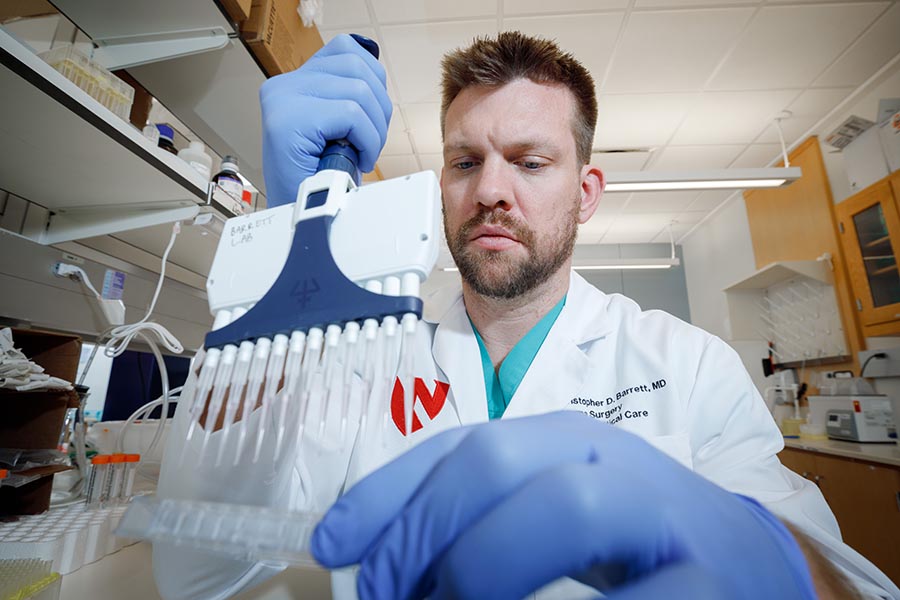The Barrett Lab

Traumatic injury is the leading cause of death from ages 1-44, responsible for more potential life years lost than cancer, heart disease and Human Immunodeficiency Virus combined. Early death after trauma often results from massive hemorrhage or severe traumatic brain injury, while delayed mortality frequently results from organ failure, infection, thromboembolic (blood clotting) events, or other complications related to prolonged critical illness.
Coagulopathy (pathologic changes in how blood clots) that contributes to bleeding and clotting complications, and inflammation that drives organ failure and infection responses, are increasingly recognized to be interrelated processes and are key players involved in many trauma-related preventable deaths. These same processes are also involved in other non-traumatic critical illnesses and surgical diseases. To improve outcomes in trauma and other critical illnesses, research to identify critical molecular and cellular regulators of inflammation and coagulopathy are key, and translational clinical trials of novel approaches to both diagnosis and therapeutics are paramount.
The Barrett Lab, led by Christopher Barrett, MD, is principally focused on both basic science and translational/clinical studies related to trauma, critical illness, and surgical diseases. Some recent and ongoing work includes 1) investigating the role of bleeding adjuncts used in trauma, such as tranexamic acid, as a context dependent pro- and anti-inflammatory agent in traumatic injury in a plasminogen-activator dependent manner, 2) delineating the molecular mechanisms of complement activation after injury and hemodynamic shock that may drive inflammatory organ failure, 3) determining the impact of bleeding adjuncts on organ healing, particularly the liver, the most commonly injured solid organ in trauma which receives its healing and growth signals from proteins like hepatocyte growth factor that are homologous to (and co-evolved with) the fibrinolysis system proteins that are targeted by the currently used bleeding adjunct therapies, 4) describing the enzyme kinetics and impact of inflammatory neutrophil proteases on coagulation and fibrinolysis proteins (plasminogen, fibrinogen, etc.) to better understand how acute inflammatory responses to injury impact our bodies ability to form and breakdown blood clots, and 5) investigating how inflammatory responses to infections and retained blood in the chest due to pneumonia and/or chest trauma lead to fibrinolysis resistance and failed therapy with the combination of tissue plasminogen activator and deoxyribonuclease that mandates invasive surgery, and several other ongoing projects.
Dr. Barrett’s projects develop new therapeutic approaches that can be taken to clinical trial. The Barrett Lab has a history of performing novel therapeutic and diagnostic trials including a Phase IIa multicenter randomized trial studying systemic fibrinolysis with tissue plasminogen activator to treat severe respiratory failure (The STARS Trial, Barrett et al, CHEST 2022, PMID 34592318), a Phase II randomized trial utilizing aspirin and rosuvastatin to reduce thromboembolic complications in critically ill trauma patients (The STAT Trial, Barrett et al, Blood Coagulation and Fibrinolysis 2023, PMID 37942744), development and observational validation of a novel clinical diagnostic assay to more rapidly diagnosis fibrinolysis perturbations in severely injured patients (Barrett et al, J Trauma Acute Care Surg 2020, PMID 33230046), and several others in various stages of design and implementation.